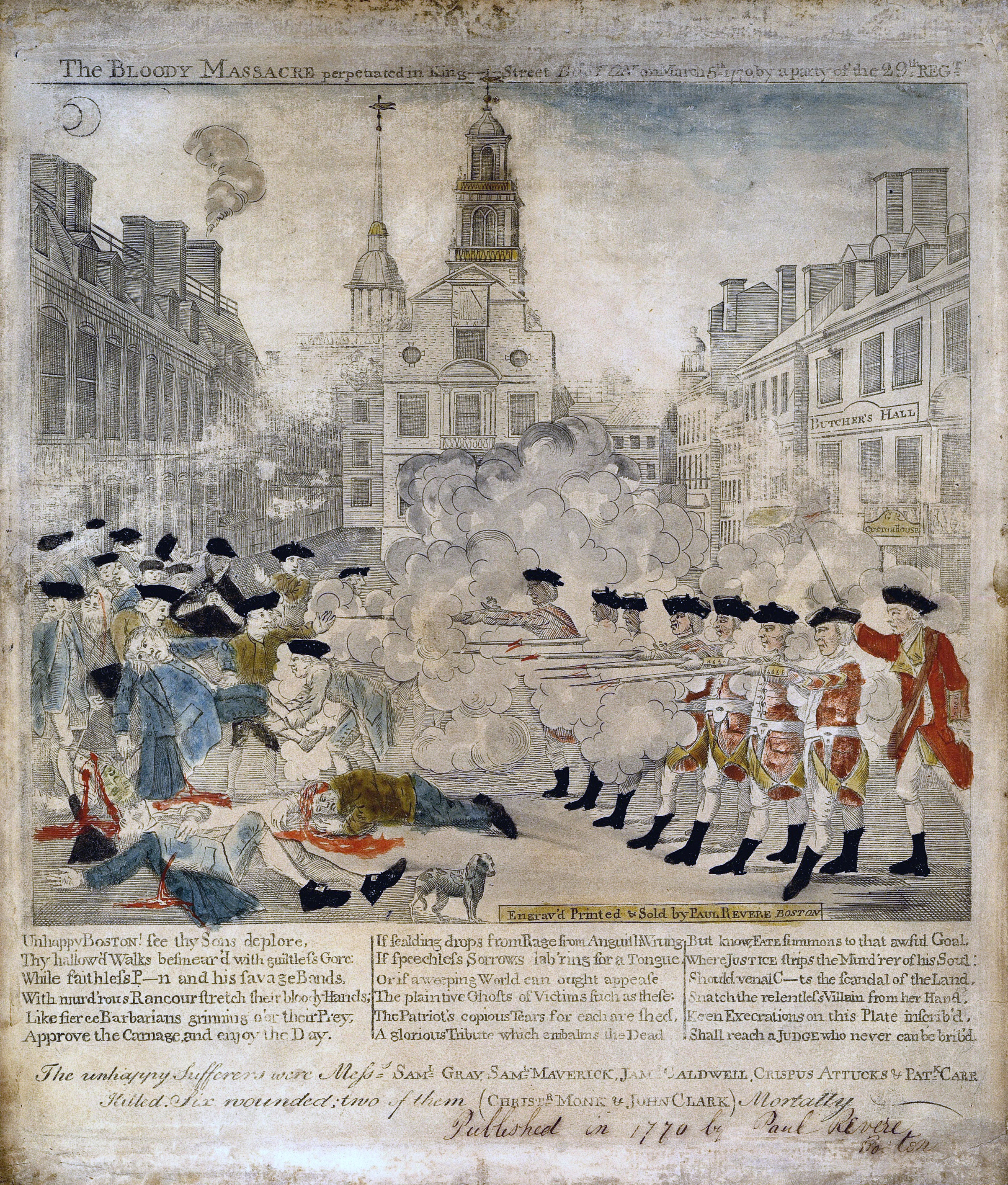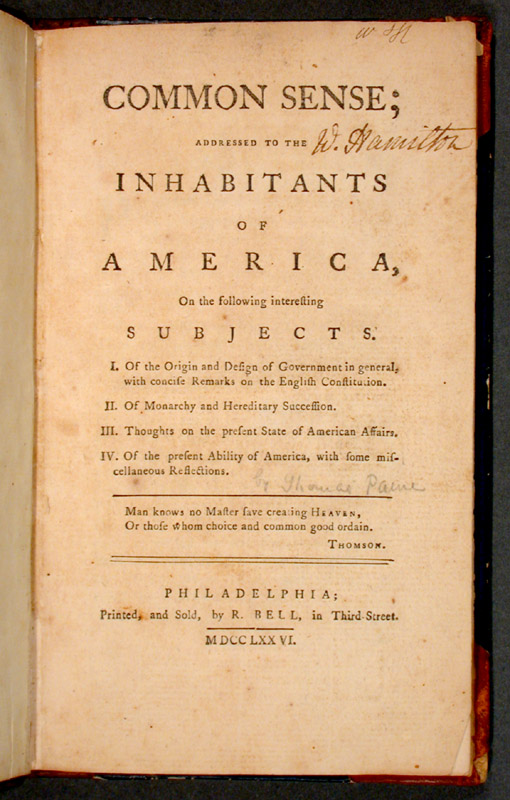 |
| http://commons.wikimedia.org/wiki/File%3AAmerican_flag.jpg http://upload.wikimedia.org/wikipedia/commons/e/ea/American_flag.jpg By Frydolin (Prosím v případě využití fotografie mimo projekty WMF o uvedení titulku "Vít Luštinec, Wikipedia" / Please credit as "Vít Luštinec, Wikipedia" in case you use this outside WMF projects.) (Own work) [CC-BY-SA-3.0 (www.creativecommons.org/licenses/by-sa/3.0)], via Wikimedia Commons |
 |
| Boston Massacre http://commons.wikimedia.org/wiki/File%3ABoston_Massacre_high-res.jpg http://upload.wikimedia.org/wikipedia/commons/e/e1/Boston_Massacre_high-res.jpg By Engrav'd Printed & Sold by Paul Revere Boston. The print was copied by Revere from a design by Henry Pelham for an engraving eventually published under the title "The Fruits of Arbitrary Power, or the Bloody Massacre," of which only two impressions could be located by Brigham. Revere's print appeared on or about March 28, 1770. (http://hdl.loc.gov/loc.pnp/ppmsc.00174) [Public domain or Public domain], via Wikimedia Commons |
| Occupy Wall Street Sign http://commons.wikimedia.org/wiki/File%3ADay_21_Occupy_Wall_Street_October_6_2011_Shankbone_16.JPG http://upload.wikimedia.org/wikipedia/commons/3/37/Day_21_Occupy_Wall_Street_October_6_2011_Shankbone_16.JPG By David Shankbone (Own work) [CC-BY-3.0 (www.creativecommons.org/licenses/by/3.0)], via Wikimedia Commons |
| Occupy Wall Street Sign http://commons.wikimedia.org/wiki/File%3ADay_21_Occupy_Wall_Street_October_6_2011_Shankbone_9.JPG http://upload.wikimedia.org/wikipedia/commons/3/39/Day_21_Occupy_Wall_Street_October_6_2011_Shankbone_9.JPG By David Shankbone (Own work) [CC-BY-3.0 (www.creativecommons.org/licenses/by/3.0)], via Wikimedia Commons |
| Young Protestor Illustrates His Frustrattion http://commons.wikimedia.org/wiki/File:Day_14_Occupy_Wall_Street_September_30_2011_Shankbone_27.JPG#file User:David Shankbone/Protests/Occupy Wall Street |
Rodger Streitmatter's chapter Sowing the Seeds of Revolution in Mightier than the Sword is an important chapter in distinguishing similar characteristics and traits that ring true in today's society and age. The colonists were ANGRY and FED up with the way the government and higher command were treating them, leaving little to no control and a state of total domination. Streitmatter illustrates beautifully how the rise of the colonists, and the rise of independent journalists and papers helped bring about change and dissension from the rule and unfair taxation by the British government. This chapter I chose specifically due to the obvious links and comparisons with our own present day "revolution", a new dawn if you will that is Occupy Wall Street. Streitmatter highlights how the colonists and particular journalists helped form an idea and spread the talks across the county...just like Occupy Wall Street has done across the country and the world. Occupy Wall Street has now spanned to such places as Denmark, Spain, Texas, Ohio, New Mexico, California, Arizona, Georgia, Maine, and the list goes on!! This IS growing, it NEEDS to continue growing, in order for our voices to be heard and loud enough for our thoughts and ideas to blossom into reality.
 |
| Thomas Paine Portrait http://commons.wikimedia.org/wiki/File%3AThomas_Paine.jpg http://upload.wikimedia.org/wikipedia/commons/2/2d/Thomas_Paine.jpg By By Auguste Millière (floruit 1876), after an engraving by William Sharp (died 1824), after a 1792 portrait by George Romney (died 1802) [Public domain], via Wikimedia Commons |
Spreading the word and allowing the masses of people to hear your voice is critical in order to bring about change. Historians credit essay writer Thomas Paine as a voice of inspiration during the American Revolution. Just as Occupy Wall Street individuals lead to represent the masses of unheard and unanswered voices of the 99% of the country, Paine was a fed up colonist who wrote to inspire and propose change to the colonists against the British. Paine published his pamphlet titled Common Sense to advocate how the men and women of this country deserved and were obligated to demand and want freedom and the ability to fulfill their destinies. In January of 1776, Common Sense was published to the masses and enhanced the concept of independence through his writing style of clarity, directness, and force. Paine wanted to ensure that even those who had trouble reading or comprehending would understand what he was writing and advocating for, and that his message was meant to spark new ideas and change in the colonists. His message resonated throughout, 150,000 copies of Common Sense were sold within three months! Paine sparked the readers attention and got them thinking about their lives and how to better fully live what they rightfully deserved, independence and freedom.
| Thomas Paine's Common Sense http://commons.wikimedia.org/wiki/File%3ACommonsense.jpg http://upload.wikimedia.org/wikipedia/commons/4/4a/Commonsense.jpg By Scanned by uploader, originally by Thomas Paine. [Public domain], via Wikimedia Commons |
The American Revolution is an essential example of how journalists can help spark change and bring about radical ideas and movements across the country. The coverage and constant updating of events and movements is key to ensuring that the public knows of what is happening in their daily lives, and relies on the news coverage in order to decide how to live their lives and what could affect them daily. Samuel Adams and Thomas Paine were two examples during the American Revolution of journalists doing their diligence by alerting the public of the injustice and unfair practices of the British government. We need more Thomas Paine's and Samuel Adams in todays society more than ever, to help spread the word of the unfair and unjust practices in 2011, and need the media to play an even larger role in order to help spread the word of Occupy Wall Street and the hundreds of other protest groups. We need to stay united and not back down from our demands, just as the colonists did in 1776. Change can be scary, change can be great, but change IS necessary in order for the people of this great country to thrive once again and balance out our great nation of free independent people who only want fair and just practices to be upheld and enforced....Sound familiar?
American Revolution Video
http://www.youtube.com/watch?v=HwWi0zdF7wk
"America the Story of Us"
September 14, 2010
A&E Home Video
http://www.history.com/search?search-field=america+the+story+of+us&asset-type=Videos
